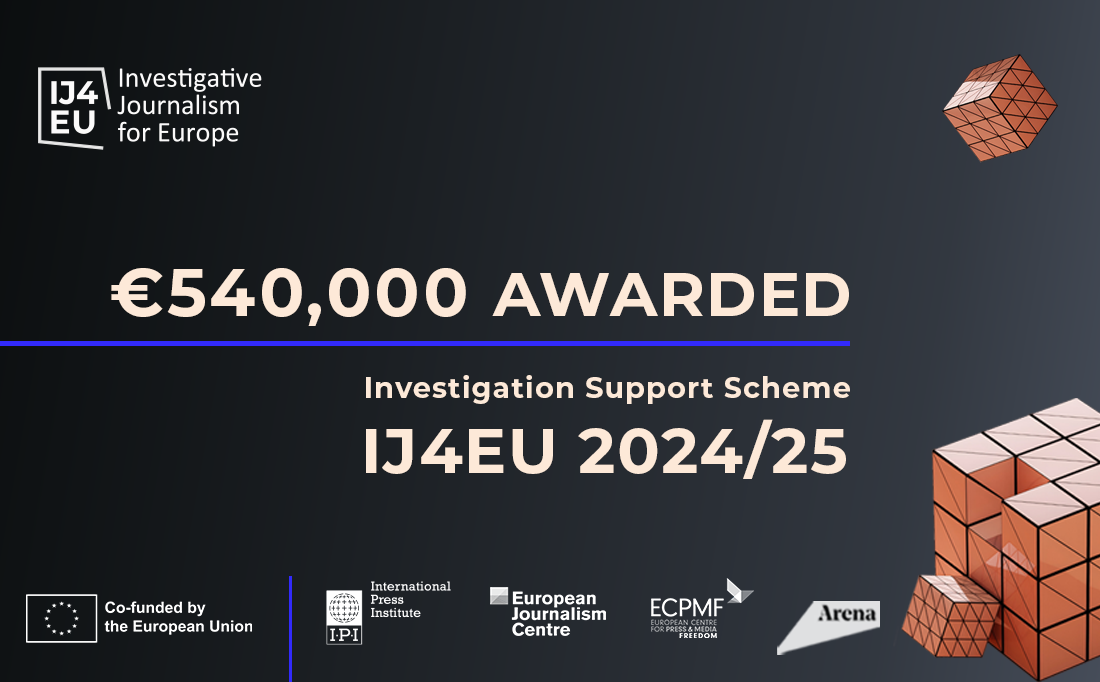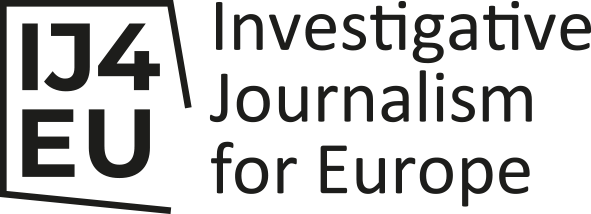An independent jury has allocated almost €540,000 in grant funding to 17 cross-border reporting teams under the latest round of the flagship grant scheme of IPI’s IJ4EU fund.
The grants will allow dozens of journalists based in 30 countries in Europe and beyond to join forces to probe subjects of public interest, ranging from artificial intelligence and ammunition supplies to pollution, big pharma and psychiatric care.
Managed by IPI, the Investigative Support Scheme is the centrepiece of the Investigative Journalism for Europe (IJ4EU) fund, now in its fifth edition.
In 2024/25, the scheme will disburse €1.5 million, offering grants of up to €50,000 to cross-border investigative teams, along with legal assistance, training and networking opportunities.
The next call for proposals will open on September 2, 2024.
The awarded investigations
In no particular order, the successful projects are:
- A cross-border investigation into criminal networks behind the movement of illicit funds across national frontiers – €50,000
- A cross-border investigation led by The Investigative Desk into the production and procurement of 155 mm ammunition shells in Europe – €48,500
- A cross-border investigation into chemical pollution and industry’s efforts to prevent regulation – €12,000
- An investigation led by Divergente into the true causes of the biggest wildfires in Portugal and Spain – €29,875
- A cross-border investigation into deforestation in Latin America by European companies and industries – €14,970
- An investigation into the impact of the pharmaceutical industry on global health – €49,998
- A cross-border investigation by an international team of four journalists documenting the use of artificial intelligence by the EU against refugees – €31,135
- A cross-border investigation into forces threatening the future of Europe’s wine industry – €11,300
- An investigation by reporters Pablo Jiménez Arandia, Evaline Schot and Pierluigi Bizzini into the use of predictive algorithms and AI tools in criminal justice and welfare policies in three EU countries – €14,430
- A cross-border investigation into European involvement in the security business in Africa’s Great Lakes region – €49,870
- A cross-border investigation into an “assault” by transnational elderly care companies on Europe’s more profitable psychiatric care sector – €14,900
- A data-driven cross-border investigation into controversial investments – €34,560
- A cross-border investigation into environmental and human rights abuses by a European oil company and its related greenwashing efforts – €14,950
- A cross-border project by Delfi Estonia, VSquare and OSINT Ukraine investigating issues related to European security – €33,900
- A cross-border investigation into sanctions evasion – €31,000
- A cross-border investigation into EU funding of the detention and deportation of refugees by a partner country – €47,000
- A cross-border investigation to quantify the scale of Sudan’s civil war, exploring Europe’s complicity in the conflict – €50,000
World-class watchdog journalism
The Investigation Support Scheme operates alongside a distinct funding and mentoring initiative within IJ4EU, specifically tailored for freelancers. Thye latest grantees of the Freelancer Support Scheme will be announced shortly.
Safeguarding editorial independence is paramount across both schemes. IJ4EU’s funding framework ensures that public and philanthropic funds bolster top-tier investigative journalism across Europe, free from any hint of editorial influence.
The bulk of IJ4EU’s funding comes from the European Commission, channelled through a consortium of impartial intermediary entities led by IPI.
The other consortium members are the European Journalism Centre, which runs the Freelancer Support Scheme; the European Centre for Press and Media Freedom, which manages IJ4EU’s annual award and conference; and Arena for Journalism in Europe, which provides practical support to applicants and grantees.
Independent juries of senior editors and investigative journalism specialists are key to the integrity of the selection process, guaranteeing a firewall between IJ4EU’s donors and grantees.
Since it started as a pilot in 2018, IJ4EU has allocated more than €4 million in grants to cross-border investigative projects, supporting important stories that have reached tens of millions of people in Europe and around the world.
Under the latest round of calls for the Investigation Support Scheme and Freelancer Support Scheme, 235 investigative teams with journalists based in 70 countries applied for a combined €6.95 million in funding.
Successful teams chosen under the Investigation Support Scheme had journalists based in 21 EU member states and nine countries further afield, including Mexico, Peru and Democratic Republic of congo.
The Investigation Support Scheme’s five-person jury, chaired by Salvadoran journalist Carlos Dada, chose the projects during a five-and-a-half-hour meeting. Selection criteria included newsworthiness, cross-border relevance, the strength of research and publication plans and risk management.
Check out our projects section to learn more about investigations previously funded by IJ4EU.
VISIT IJ4EU WEBSITE

